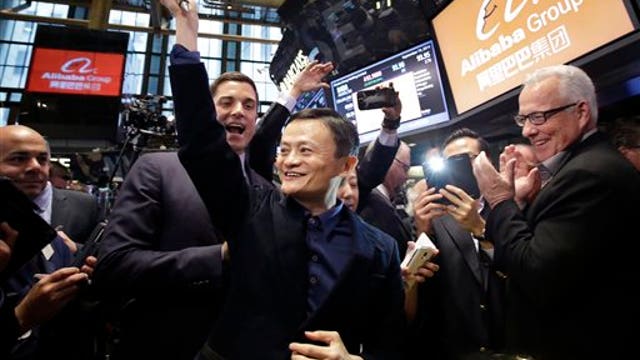Tech Rewind: Alibaba Makes History, CEOs Step Down
The day the tech world has been waiting for has finally arrived: China’s Alibaba made its public debut. These are the biggest headlines in the tech space this week.
The trading floor looked a lot like a scrum early Friday as investors waited for Alibaba (NYSE:BABA) to begin trading on the New York Stock Exchange. Shares of the e-commerce giant surged 36% after it made its hotly-anticipated debut, opening at $92.70, that's 36% above its IPO price of $68. The company’s value rose to nearly $231 billion, in what looks like the biggest public offering in history.
Alibaba Chairman Jack Ma told FOX Business’s Jo Ling Kent the company is “building an ecosystem, and the government is an important part,” adding that they are there to help small businesses, not compete with them.
On the heels of last week’s glittering product unveil, Apple (NASDAQ:AAPL) revealed record pre-order sales for its new iPhone 6 and iPhone 6 Plus. The two new iPhone models went on sale in stores Friday morning, where crowds of consumers who camped out for weeks eagerly waited. Early reviews of the phones are mixed, as investors voice doubts about how secure Apple Pay – the new mobile payment features – actually is.
American astronauts will have swanky new rides in the next couple of years – NASA awarded Boeing (NYSE:BA) and SpaceX “space taxi” contracts to ferry astronauts to and from the International Space Station. SpaceX CEO Elon Musk told FOX Business’s Liz Claman the deal will take the space transportation to a new frontier (literally).
And after much speculation, Microsoft (NASDAQ:MSFT) inked a $2.5 billion deal for the Swedish game developer behind Minecraft – the most popular game on Xbox, and the top paid app on iOS and Android in the U.S. Microsoft CEO Satya Nadealla praised Minecraft saying, “it is more than a gaming franchise… it is an open world platform.”
It was a week full of departures from the c-suite, as several big name companies bid their farewells to chief executives.
Oracle's (NYSE:ORCL) CEO Larry Ellison announced on Thursday he would ste down from his post as the software company’s chief executive after 40 years at the helm. Ellison will assume the role of chief technology officer, and Safra Catz and Mike Hurd will move up to co-CEO positions from their previous co-president roles. The news came in tandem with a quarterly report card for the company which posted fiscal first-quarter earnings per share of 62 cents on revenues of $8.6 billion, missing Wall Street views.
Struggling electronics retailer RadioShack (NYSE:RSH) announced this week its CEO John Feray resigned. The news came just days after the company posted its tenth-straight quarterly earnings miss and stated it might have to file for bankruptcy.
JetBlue (NASDAQ:JBLU) CEO Dave Barger also announced his retirement. Current president Robin Hayes will step up to lead the popular airline. Barger said the decision to leave was a mutual one between him and the board, adding "you just kind of know when you need the next level of ideas, innovation, evolution.”
A U.S. court in California ruled that Uber must face a civil lawsuit alleging the ride-share company charged customers a 20% driver gratuity, but pocketed most of that amount. Meanwhile, Germany’s nationwide ban on Uber lasted all of two weeks. The company was under a temporary restraining order. A court in Frankfurt lifted that ban, but it still remains unclear if Uber will be permitted to operate in the country.
Netflix (NASDAQ:NFLX) launched in France on Monday, partnering the country’s third-largest telecom operator Bouygues to offer its video streaming content on the French brand’s set-top boxes. Subscriptions will start at $10.35 a month and the video-streaming platform says it has plans to expand its footprint in Europe to Germany, Austria, Switzerland, Luxembourg and Belgium.
And a San Francisco startup has raised $8 million in funding to make wearable tech the norm in the doctor’s office. Wearable Intelligence plans to bring workplace applications to technology such as Google Glass. The company told FBN’s Maria Bartiromo it hopes to drive digital access to all workplace environments, especially those where workers are out in the field and where traditionally tech hasn’t been available.




















